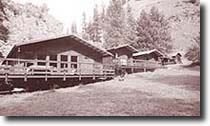In a major victory for Wild and Scenic River protection nationwide, a federal court has ruled that three resorts on the Wild and Scenic Salmon River in central Idaho must be removed. The ruling by U.S. Circuit Judge Sidney R. Thomas found that, “the law is clear: the construction of permanent resort lodges is not permitted in the Wild River corridor” and is clearly “inconsistent with the Wild and Scenic Rivers Act (WSRA).”
 Wilderness Watch, the national wilderness organization that brought the lawsuit, hailed the 51-page decision as an unprecedented triumph for wild rivers. According to the group’s attorney Jack Tuholske, “It’s a great victory for wild rivers and upholds Congress’ clear direction that they remain ‘vestiges of primitive America.'”
Wilderness Watch, the national wilderness organization that brought the lawsuit, hailed the 51-page decision as an unprecedented triumph for wild rivers. According to the group’s attorney Jack Tuholske, “It’s a great victory for wild rivers and upholds Congress’ clear direction that they remain ‘vestiges of primitive America.'”
The pivotal issue before the Court was whether the Forest Service’s decision permitting permanent developments on public lands was consistent with the mandates of the WSRA, which requires that the river and its shorelines must remain essentially primitive. The Court rejected the Forest Service’s claim that “essentially primitive” is ambiguous and thus subject to the agency’s interpretation. The Court also rejected the Forest Service argument that the Central Idaho Wilderness Act (CIWA) that established the Salmon Wild and Scenic River allowed the resorts.
“You can’t underestimate the importance of this victory,” said George Nickas, Wilderness Watch’s executive director. “The Forest Service argued in Court that it had the authority to approve similar resorts along any one of our nations 57 Wild rivers that it is entrusted with protecting. Let’s hope they got the message and now know better.”
Over the years, the Forest Service turned a blind eye as permanent resorts sprang up at two sites (Arctic Creek and Stub Creek) along the Salmon River where outfitters had been granted permits allowing temporary facilities (e.g. canvas tents) only. In 1988, the Forest Service approved the construction of a third resort, known as the “Guth” camp, at Smith Gulch. That decision triggered Wilderness Watch’s lawsuit.
Bill Worf, a 30-year Forest Service-veteran and a founder of Wilderness Watch noted that the organization was born out of this dispute. “We had to organize citizens to fight this battle because officials on the Salmon National Forest caved in to private interests.” Worf pointed to the Judge’s description of how Salmon National Forest supervisor Dick Hauff approved the resorts over the objections of Bitterroot National Forest supervisor Bob Morgan. Worf noted that the Salmon National Forest administers the river corridor, even though the Guth resort lies on the Bitterroot. He added, “Morgan’s staff told him the lodges were illegal and Bob agreed! Judge Thomas validated Bob’s position when he wrote, ‘The analysis of the Bitterroot National Forest staff has been entirely correct from the onset.’ I know many fine Forest Service people, those still working and those who have retired, who are quietly celebrating this decision.”
Nickas concluded by stating, “The Forest Service has a chance to redeem its stewardship responsibilities by moving expeditiously to remove the lodges and bring the outfitters’ camps into compliance with the law. It’s too bad for the outfitters who will have to tear down their buildings because the Forest Service turned a blind eye to the rules. Yet the public’s been cheated out of its premier wild river for so long. Let’s hope the Forest Service now turns its attention to restoring the land, rather than continuing to promote private interests at the public’s expense.”
Judge Thomas’ decision, Wilderness Watch, et al., vs. U.S. Forest Service (CV 91-103-M-SRT) can be viewed at http://www.wildernesswatch.org.